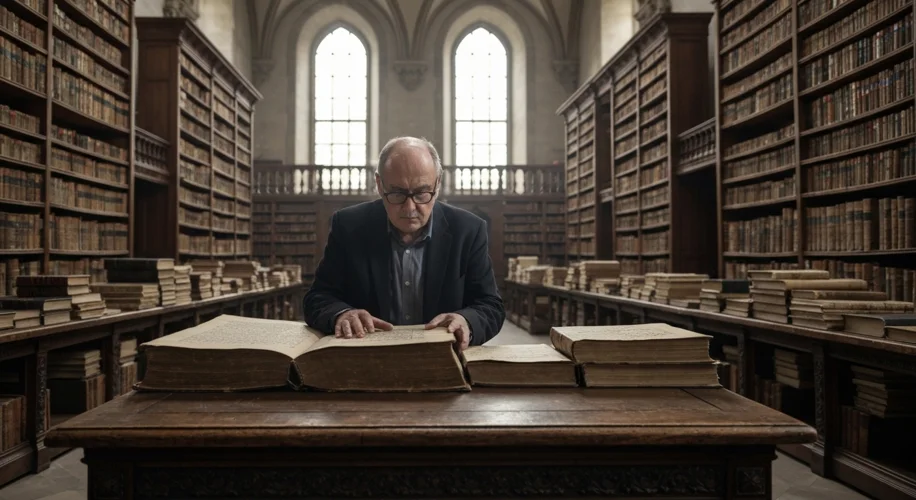In the tumultuous dawn of the 20th century, a figure emerged who would dedicate his life to the meticulous preservation and dissemination of Karl Marx and Friedrich Engels’ intellectual legacy. This was David Riazanov, a scholar whose name, though perhaps not as widely recognized as Marx or Lenin, is inextricably linked to the very foundations of Marxist thought. His story, however, is not just one of academic brilliance but also a tragic testament to the brutal realities of political repression, a stark reminder of how easily great minds can be extinguished in the unforgiving fires of ideological purges.
Riazanov’s journey began in Odesa, then part of the Russian Empire, in 1876. Born as David Borisovich Goldendach, he was steeped in the revolutionary fervor that animated Russia’s intelligentsia. From a young age, he was drawn to Marxism, seeing in its theories a potent tool for understanding and transforming the world. His early activism led to arrests and exile, experiences that only seemed to strengthen his resolve. He became a prolific writer, a fervent organizer, and a leading voice within the Russian Social Democratic Labour Party.
The pivotal moment in Riazanov’s life, and indeed for Marxist scholarship, arrived after the Russian Revolution. While many revolutionaries focused on immediate political power, Riazanov turned his attention to the historical and theoretical underpinnings of their movement. He recognized that the full breadth and depth of Marx and Engels’ ideas were scattered, incomplete, and often misunderstood. His vision was grand: to gather, edit, and publish every significant work, letter, and manuscript produced by these intellectual giants, creating a definitive archive for future generations.

This Herculean task led Riazanov to establish the Marx-Engels Institute in Moscow in 1921. Under his leadership, the institute became an unparalleled center for Marxist research. Riazanov was not merely a curator; he was a detective, a linguist, and a brilliant editor. He scoured archives across Europe, tracking down lost manuscripts, deciphering faded ink, and meticulously annotating the vast corpus of Marx and Engels’ writings. His efforts brought to light crucial works that had been languishing in obscurity, such as the Economic and Philosophic Manuscripts of 1844, which provided profound insights into Marx’s early humanist thought. He also unearthed thousands of letters, revealing the personal and intellectual collaboration between Marx and Engels in unprecedented detail.
The publications emanating from the Marx-Engels Institute under Riazanov’s direction were nothing short of revolutionary. They provided scholars worldwide with accurate, critical editions of foundational Marxist texts, free from the distortions and omissions that had plagued earlier versions. His introduction to Das Kapital, for instance, was a scholarly masterpiece in itself, contextualizing Marx’s economic theories with historical and philosophical rigor. Riazanov’s dedication ensured that Marx and Engels spoke to the world in their own authentic voices, unmediated by political agendas or selective interpretations.
However, Riazanov’s commitment to objective scholarship and his independent intellectual spirit began to put him at odds with the increasingly authoritarian regime of Joseph Stalin. As Stalin consolidated power, any intellectual dissent or perceived lack of ideological purity became a dangerous liability. Riazanov, with his international reputation and his vast archive, represented a potential independent intellectual force that the state could not fully control. His insistence on scholarly accuracy sometimes clashed with the Soviet state’s need for a simplified, dogmatic version of Marxism to legitimize its rule.
The inevitable clash came in 1931. Riazanov was abruptly removed from his position as director of the Marx-Engels Institute and expelled from the Communist Party. The official charges were vague – “counter-revolutionary activity” and “ideological distortion.” He was arrested and, in a chilling echo of the purges to come, subsequently sentenced to five years in the Gulag. He was later exiled to the Kazakh SSR, where he continued his scholarly pursuits in isolation, a shadow of his former self.
Tragically, David Riazanov never returned from exile. He died in Saratov in 1938, a victim of Stalin’s Great Purge, which claimed the lives of millions of Soviet citizens, including many of the nation’s most brilliant intellectuals and artists. His fate serves as a grim reminder of the fragility of knowledge and the devastating consequences of totalitarianism on intellectual freedom.
Despite his tragic end, Riazanov’s legacy endures. The monumental collection of works he curated and edited remains the standard for Marxist scholarship worldwide. His painstaking efforts ensured that the ideas of Marx and Engels were preserved in their most complete and authentic form, allowing countless thinkers and activists to engage with their work critically and comprehensively. David Riazanov, the purged architect of Marxist scholarship, may have been silenced, but the foundations he laid continue to resonate through the corridors of history and intellectual thought.

